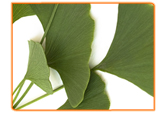Does Ginkgo Biloba Fight Memory Loss During Menopause?
 If you’re considering treatments for memory loss during menopause, you’ve likely come across Ginkgo Biloba. The herbal supplement has been used for centuries for its reported stimulating effects on memory and concentration. But will it work for you? And what evidence exists of its apparent benefits? Keep reading to learn more about the facts behind Ginkgo Biloba.
If you’re considering treatments for memory loss during menopause, you’ve likely come across Ginkgo Biloba. The herbal supplement has been used for centuries for its reported stimulating effects on memory and concentration. But will it work for you? And what evidence exists of its apparent benefits? Keep reading to learn more about the facts behind Ginkgo Biloba.
How Ginkgo Biloba Works
Is there any scientific evidence for Ginkgo Biloba's benefits? The short answer is no. Further studies are needed for complete, verifiable proof of the supplement’s effectiveness or lack thereof. We do know, however, that the plant has a centuries-long history in Chinese medicine, and is most often cited for its benefits to brain function. Ginkgo Biloba has been used to treat other menopausal symptoms as well, including:
. Osteoporosis
. Tinnitus
. Intermittent claudication
. Poor mood
. Loss of libido
. Sleep disturbances
. Macular degeneration
Though little is known about how Ginkgo Biloba works in the body, many have speculated that the plant’s effectiveness comes from its ability to boost blood flow to the brain and other organs. This may improve brain function and help combat the menopausal symptom of memory loss.
 Ginkgo Biloba is also thought to contain phytoestrogens, natural plant hormones with a similar structure to estrogen. A decline in estrogen levels is a major cause of memory loss during menopause, so boosting these levels naturally could provide relief to many symptoms. Scientific knowledge of phytoestrogens is limited, however, so verifying that the compounds actually do provide menopausal relief is not yet possible.
Ginkgo Biloba is also thought to contain phytoestrogens, natural plant hormones with a similar structure to estrogen. A decline in estrogen levels is a major cause of memory loss during menopause, so boosting these levels naturally could provide relief to many symptoms. Scientific knowledge of phytoestrogens is limited, however, so verifying that the compounds actually do provide menopausal relief is not yet possible.
If Nobody Knows if It Works, Then Why Take It?
Unfortunately, uncertainty surrounds most herbal remedies, Ginkgo Biloba included. The bright side, however, is that the plant, when taken in normal doses, causes no known serious side effects, though an overdose may carry symptoms such as an upset stomach, headaches and diarrhea. You may want to try easing Ginkgo Biloba into your diet, drinking tea containing the extract or putting a teaspoon of its powdered form in your drink at mealtimes. Then, take notice of any changes to your mental abilities or general health.
Coupled with a diet and exercise, Ginkgo Biloba could help you to boost brain function and combat the symptom of memory loss during menopause. Go to the following link to learn more about Ginkgo Biloba.



























